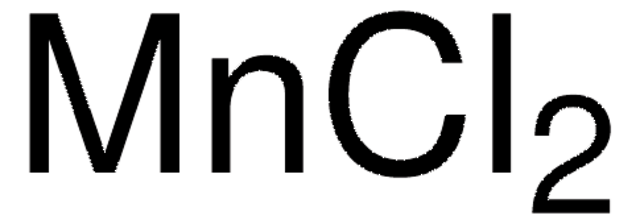221279
Manganese(II) chloride tetrahydrate
ACS reagent, ≥98%
Synonym(s):
Manganous chloride tetrahydrate
About This Item
98.0-101.0% (ACS specification)
Recommended Products
grade
ACS reagent
Quality Level
Assay
≥98%
98.0-101.0% (ACS specification)
form
crystals
impurities
≤0.005% insolubles
pH
3.5-6.0 (25 °C, 5%)
mp
58 °C (lit.)
anion traces
sulfate (SO42-): ≤0.005%
cation traces
Ca: ≤0.005%
Fe: ≤5 ppm
K: ≤0.01%
Mg: ≤0.005%
Na: ≤0.05%
Zn: ≤0.005%
heavy metals: ≤5 ppm (by ICP)
SMILES string
Cl[Mn]Cl.[H]O[H].[H]O[H].[H]O[H].[H]O[H]
InChI
1S/2ClH.Mn.4H2O/h2*1H;;4*1H2/q;;+2;;;;/p-2
InChI key
CNFDGXZLMLFIJV-UHFFFAOYSA-L
Looking for similar products? Visit Product Comparison Guide
Application
Signal Word
Danger
Hazard Statements
Precautionary Statements
Hazard Classifications
Acute Tox. 3 Oral - Eye Dam. 1 - STOT RE 2
Target Organs
Brain
Storage Class Code
6.1D - Non-combustible acute toxic Cat.3 / toxic hazardous materials or hazardous materials causing chronic effects
WGK
WGK 2
Flash Point(F)
does not flash
Flash Point(C)
does not flash
Regulatory Listings
Regulatory Listings are mainly provided for chemical products. Only limited information can be provided here for non-chemical products. No entry means none of the components are listed. It is the user’s obligation to ensure the safe and legal use of the product.
PRTR
Class I Designated Chemical Substances
ISHL Indicated Name
Substances Subject to be Indicated Names
ISHL Notified Names
Substances Subject to be Notified Names
JAN Code
221279-500G:4548173216812
221279-6X500G:
221279-BULK:
221279-VAR:
221279-100G:4548173216805
Choose from one of the most recent versions:
Already Own This Product?
Find documentation for the products that you have recently purchased in the Document Library.
Customers Also Viewed
Our team of scientists has experience in all areas of research including Life Science, Material Science, Chemical Synthesis, Chromatography, Analytical and many others.
Contact Technical Service









